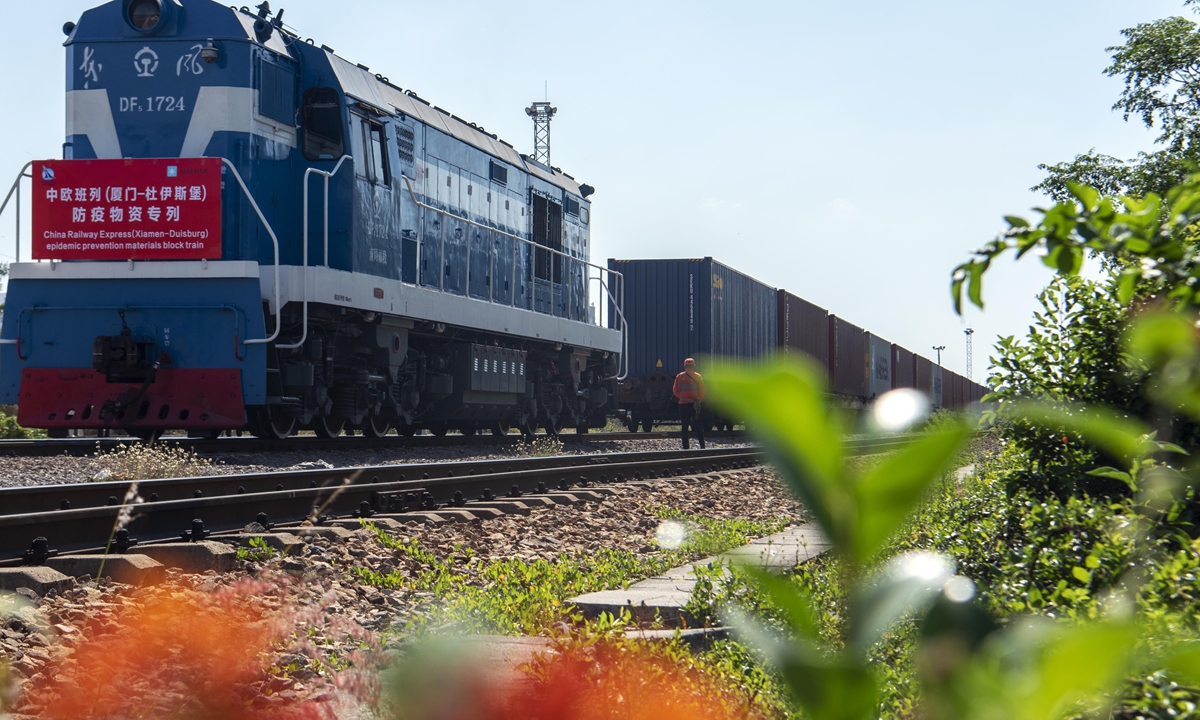
A China-EU train full of self-test kits for COVID-19 leaves Xiamen, East China's Fujian Province, for Duisburg, Germany on Wednesday. This is the first train to take anti-epidemic supplies from Xiamen. The station has operated a total of 967 China-EU trains since 2015. Photo: cnsphoto
Traders and industry representatives said China-Europe freight train services will experience some manageable disruptions given its booming demand and mature service and facilities, in response to recent speculation about the possible abolition of government subsidies for cross-border cargo trains next year.
While freight train services have been through unprecedented challenges, they have continued breaking records in terms of the number of trains dispatched. Industry insiders believe that the train service already has the capability for full market operation with subsidies becoming less and less important.
Speculation about the abolishment of subsidies was recently brought up at the European Silk Road Summit held in Amsterdam, the Netherlands, by several Chinese industry participants, according to media reports.
While several traders and industry representatives were not fully aware of the speculation when reached by the Global Times on Friday, they believe the actual impact on train services will be within expectation and manageable if subsidies are slashed in the future.
There is a possibility that train subsidies will end next year, given that they have been reduced year-on-year and cannot last forever, a senior industry insider told the Global Times on Friday.
In addition to market trends, the reduction in subsidies would be a signal for the changing trade focus toward Southeast Asian countries, which is expected to remain the number one trading partner with China this year, especially with the opening of the China-Laos railway, the person said.
From the current point of view, the abolition of subsidies for China-Europe express trains should have more advantages, as "after 10 years of development, China-Europe express trains have cultivated a relatively fixed group of customers, including some in Germany and some Northern European countries like Belarus, an increasingly important hub for trains," the insider said.
"The intensity of market demand for trains is already far greater than the intensity of subsidies. For example, the freight rate of a 40-feet container used to be $10,000, but it has now reached about $20,000, and the subsidy is only a few thousand dollars," Kang Shuchun, a director of the China Federation of Logistics and Purchasing, told the Global Times on Thursday, indicating the rising role the market is playing in cross-border transportation services.
The subsidies stand at around $1,000 per 40-feet container (depending on regions), while the Chinese government will phase out the subsidies by the end of 2023 — it was planned to be the end of 2022, but this was extended a year due to COVID-19, according to Jacky Yan, founder and CEO of New Silk Road Intermodal, cited by foreign industry service provider loadstart.com.
At their peak, the subsidies were $3,000-5,000 per container, but it has now come down to $1,000, according to media reports.
Even though the subsidies are being reduced year-by-year, train service demand has remained resilient despite logistics hurdles, the epidemic and other factors this year.
From January to November, about 14,000 China-Europe freight trains had been dispatched, a year-on-year increase of 20.3 percent, bucking the trend, the latest data from China Customs showed.
Tommy Tan, president of Shanghai EPU Supply Chain Management Co, an agent of China-EU freight trains, told the Global Times on Friday that he will always choose China-Europe trains, whether they have subsidies or not.
"Our customers have not asked about subsidies so far this year; they are more concerned about whether the containers are sufficient and whether the transportation time is normal," Tan said.
While speculation for the exact time and outcome of the subsidy abolition lingers, insiders said that there would be some pressure on places that lack sources of goods and cities with greater demand for trains if the subsidies are cut.
Furthermore, products with relatively high added value, including new energy products, will account for an increased proportion of China-Europe Express products, while low value-added goods such as bulk commodities will tend to be shipped via cheaper sea freight as a result of the change in subsidies, insiders said.




